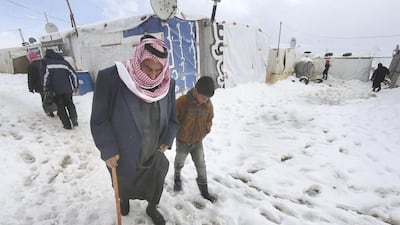BAR ELIAS, Lebanon // Twelve children huddle inside Jourieh’s tent, seeking to escape the thick snow and frigid air in this Bekaa Valley town.
The cold creeps through the carpets lining the mud floor and the children shiver. They edge closer to touch the tin pot where a simple broth boils atop the wood stove.
It’s too cold to go outside and over the past days their lives have been dominated by waiting for the storm to end.
“[In Syria before the war] we had a stove that burned oil and the children were never cold,” says Jourieh, 38, who is originally from the country’s central Hama province.
Having lived in the tent for four years, Jourieh's family is among the three million refugees affected by the worst winter storm to hit the Middle East in decades.
At least three Syrian refugees have died from the cold in Lebanon. In Bar Elias, a town 11-kilometres from the Syrian border, three children were brought to the hospital on January 7 with hypothermia.
UNHCR, the United Nation’s refugee agency, estimates that 55 per cent of Lebanon’s 1.1 million registered refugees are living in substandard shelter.
At least 1.5 meters of snow has fallen on the Bekaa region, where 144,000 Syrian refugees have settled in about half of the country’s informal camps. In total, there are 1,435 so-called informal settlements in Lebanon, according to UNHCR.
What passes for housing in these encampments is temporary structures built from wood and canvas. Some are made from torn down billboards, advertisements for a red Mercedes, perfume, and slim cigarettes that stand in sharp contrast to the refugees’ poverty.
The refugees were ill-prepared for the cold that began on Tuesday with the arrival of the storm known as Zina, in Lebanon and Huda in Jordan. Some of the children have only open backed shoes and no socks. The poorest refugees are completely reliant on the UN.
Jourieh receives a monthly $30 (Dh110) per person food allowance from the UN. Only two of her eight children have jobs. Her 19-year-old daughter plants garlic and potatoes, but has not worked since winter began.
Her son, 14-year-old, Ahmed, makes 25,000 Lebanese Pounds (Dh60) per week at a local garage. The money allows her to buy four or five bags of wood for between LBP5,000 — 7,000 each.
“My husband doesn’t work, what am I to do?” she says, while cradling her one-year-old baby.
The refugees that cannot afford the wood burn plywood or other scraps that they scavenge. When the those run out, burning rubbish is the next best option.
“When this crate is finished I will have nothing,” says Fawzi Al Hassan Al Saib, a 31-year-old refugee from Homs, pointing at a plastic crate of wood in the corner of her tent.
The weight of the snow has cracked a wooden beam supporting the roof and a draft comes in under one side as the wind blows under the canvas, which is not properly secured.
Even if the tents are drafty, most do have some source of heat, usually wood burning stoves provided by the UN or purchased for about $100.
There are others worse off, says Mohammed Khalil, vice president of the Bekaa office of Dar Al Fatwa, an Islamic charity providing relief, including small stoves.
“A lot of people are renting garages, stores, shops [that have no heating]. There are people who are colder than those in tents,” he says.
Lina Nouh, 38, a refugee from the Damascus suburb of Darayya, hasn’t had a stove since she fled home two years ago. She stayed in the Damascus countryside before arriving in Lebanon five months ago along with her husband and two children.
The family lives in a rented house in Bar Elias. She and her 15-year-old daughter, Amer, sold all their jewellery to make $300 for the first three months rent.
The house’s living room is damp, the ceiling moulding, and they have no heating. They tried to insulate the room with cardboard boxes, but the freezing weather still made its way inside.
“I couldn’t sleep last night because of the cold,” she says.
Three days into the storm, a neighbour provided them with a small electric heater. But in this part of Lebanon the electricity is out for at least 12 hours a day and Lina’s family, who has not been able to pay rent for two months, cannot afford a generator. They receive food aid from the UN and Dar Al Fatwa, but cannot find work.
“I don’t know where to go,” she says, breaking down in tears.
Despite the cold she dreads the day when the storm will end.
“This storm was a blessing in disguise, because at least now the landlord can’t come and ask for the rent,” she says.
foreign.desk@thenational.ae

